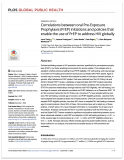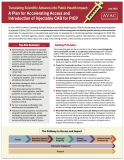- About UsOur Story, Our Team & Support Information
- What We DoAdvocacy to Achieve the End of AIDS
- Advance HIV/SRH Integration
- Advocate for Access to High-Impact Prevention
- Improve Research Conduct
- Product Innovation & Availability
- Promote Effective HIV Prevention Policy
- Strengthen Global Advocacy Networks
- Track and Translate the Field
- Our FocusInterventions to End the Epidemic
- ResourcesPublications, Infographics, Events & More
- MediaInformation & Resources for the Press
- Our BlogPrevention News & Perspective
PrEP works. Investment in more options must continue, and faster, smarter rollout must be a top priority.
Clinical trials have shown that different types of pre-exposure prophylaxis (PrEP) using antiretroviral (ARV) drugs dramatically reduce the risk of HIV infection for people who take it as directed. While PrEP won’t be right for every individual at risk for HIV, millions will benefit—if they can access this potentially life-saving option.
So far, PrEP’s implementation has been piecemeal. Meanwhile the landscape is changing as more options move through research, regulatory review or enter the market, intensifying the need to improve implementation.
TDF/FTC (brand name Truvada) was first approved for use as oral PrEP in 2012, now dozens of countries have approved it, but PrEP still has not reached many of the people who need it most. In 2019, F/TAF (brand name Descovy) became the 2nd oral PrEP product to be approved, but only for men who have sex with men (MSM) and transgender women. Efficacy studies of F/TAF among cisgender women are ongoing. Findings reported in 2020 show injectable cabotegravir is safe and effective and the product is undergoing regulatory review. For more information go to our dedicated pages on cabotegravir on AVAC.org and PrEPWatch.
For all these interventions and other ARVs still in the R&D pipeline, advocacy is crucial: There must be continued investment in the development of additional options, community engagement must be integrated from trial design to implementation, and improved programming must support those who need HIV prevention options the most.
What We're Reading
Featured Resources

